If you’re trying to host a lot of video for your website, your server likely doesn’t have the storage capacity or bandwidth to host videos without diminishing your site performance and streaming quality. Video hosting sites, on the other hand, are like digital warehouses where you can easily store, track, and post your video content to multiple platforms.
Why bog down your own servers—or risk getting booted from your web host—when you can upload your videos to a third party, embed the videos on your website and wherever else you want them to play, then relax and let the hosting site do the heavy lifting?
If you’re in the market for a new video hosting site, you’re in the right place. We’ve ranked 10 of the best video hosting platforms to consider based on their features, pros, and cons, so you can find the right one for your creator business.
What is a video hosting site?
A video hosting site is an online platform that allows you to upload video content that can be accessed by viewers who visit specific web pages. A video hosting service can accommodate two main types of videos:
- Pre-recorded videos. Just as the name suggests, pre-recorded videos are produced in advance and then uploaded to a video hosting service. Examples include unboxing videos, full-length films, product demos, tutorials, or anything else you might record in advance.
- Livestreams. In a live video, a hosting site broadcasts your video content in real time as you are filming. This type of video covers live news broadcasts, teleconferences, and webinars.
Why do you need a video hosting site?
You may be doubting the point of video hosting services. Why not just host videos on your website and cut out the middleman? Here’s why:
- Videos use a lot of bandwidth. Video hosting puts a lot of stress on web servers—so much so that a heavily streamed video can crash some websites. The top video hosting platforms handle this web traffic for you, so your website won’t crash from all the video streams when you upload that cooking video.
- You can embed videos from a video hosting platform right into your website. Your viewers don’t actually need to head to a separate video hosting platform to view all your great content. Using some simple HTML5 code (which the hosting site will provide), you can embed video files onto any page of your website. You get the best of both worlds: video on your website and users staying right where you want them.
- Your potential audience can be as big or as small as you’d like. Video hosting sites usually come with a built-in audience, so if you post your video publicly, there’s a chance that it’ll be seen more widely than if you only posted it to your website. On the contrary, if you’d rather keep your video private, many hosting sites allow for unlisted or even password-protected video links.
10 best video hosting sites for creators
The best video hosting sites have plenty of bandwidth, the ability to handle large file sizes, and easy options to share your videos with the world. When you’re ready to host your own videos online, consider some of these options.
- YouTube
- Vimeo
- HubSpot
- Brightcove
- Wistia
- SproutVideo
- Cincopa
- Hippo Video
- Dailymotion
- Vidyard
| Platform | Free Option? | Key Storage/Length Limits | Unique Perk |
|---|---|---|---|
| YouTube | Yes (unlimited) | Max 2 hours per video (verified) | Massive built-in audience |
| Vimeo | Yes (basic plan) | Up to 500MB/week of free uploads | Ad-free player even on free tier |
| HubSpot | No dedicated free hosting tier | Depends on your HubSpot subscription | Deep integration with marketing & sales tools |
| Brightcove | No | Enterprise-scale, custom limit | Robust for large organizations |
| Wistia | Yes (limited to 10 videos) | Up to 1 GB per file | Strong analytics & branding tools |
| SproutVideo | No free plan, but free trial | Tiered limits based on subscription | Playlist creation & strong support |
| Cincopa | No free tier, monthly fees | Varies by plan | Also hosts audio & images |
| Hippo Video | No completely free plan | Limited storage at lower tiers | Category-based workflows (sales, marketing, etc.) |
| Dailymotion | Yes | Up to 2 GB or 60 minutes per video | Clear category organization |
| Vidyard | Yes (25 videos, 5 embeds) | Up to 30 minutes per video on free plan | Easy share links & in-depth analytics |
This quick reference can help you spot which free or entry-level plan might handle your needs right now — whether you’re looking for unlimited uploads, lightning-fast streaming, or an ad-free environment.
1. YouTube
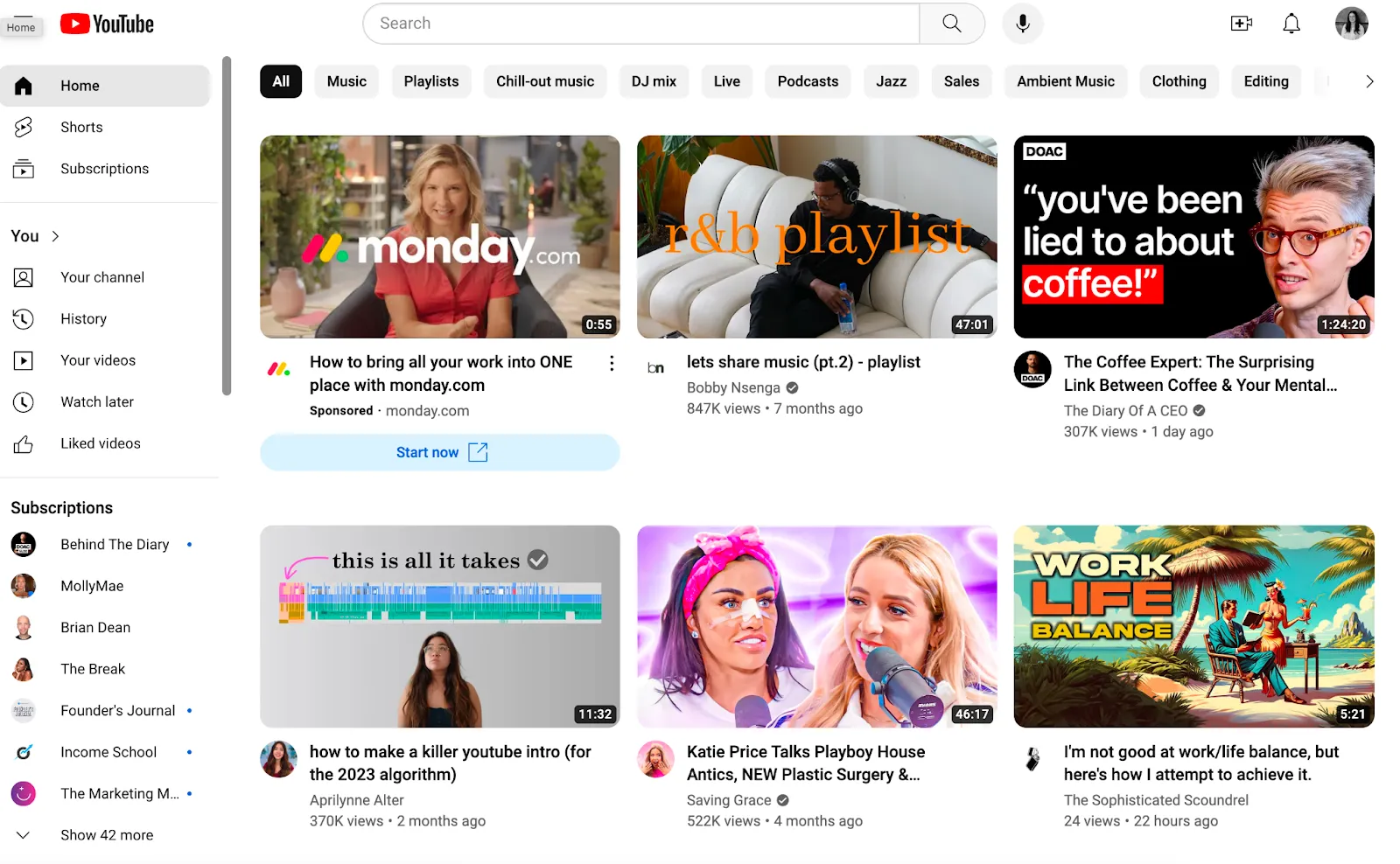
YouTube is the largest video hosting service in the world. It also has some of the most robust features, including search engine optimization (SEO), ample video analytics tools, and a quick video uploader for mobile. Its video player interface is also quite familiar to users.
The downside to that massive size is that videos on the platform face steep competition. Everyone can post videos on YouTube (and seemingly everyone does), so you need to invest a lot of effort to make your content stand out. YouTube may also subject your viewers to ads, or show them irrelevant content when the video ends. This makes it less ideal for corporate brands who need precise content management.
Pros of YouTube:
- Largest and most popular video-sharing platform in the world—has most active users
- Advanced analytics
- User-friendly video player
- Video marketing tools
- Has its own CDN, so no lag for viewers
Cons of YouTube:
- No quality control
- Second largest social media platform—hard for your videos to get noticed
- No control over which ads play before/during/after your videos
2. Vimeo

Compared to YouTube, Vimeo offers its viewing audience a more curated experience. While far fewer viewers use Vimeo for entertainment, viewers often associate it with higher-quality content than what YouTube may offer.
Many film editors use Vimeo to internally share videos before releasing them to the world. Vimeo offers a free plan, but its advanced functions and file storage options get unlocked with paid plans.
Pros of Vimeo:
- Rated 4.2 out of 5 stars on G2
- More curated viewing experience
- Host high-quality videos
- Offers password protection for private video sharing
Cons of Vimeo:
- Fewer users than YouTube
- To unlock advanced functions and file storage options, you must upgrade to a paid plan
3. HubSpot
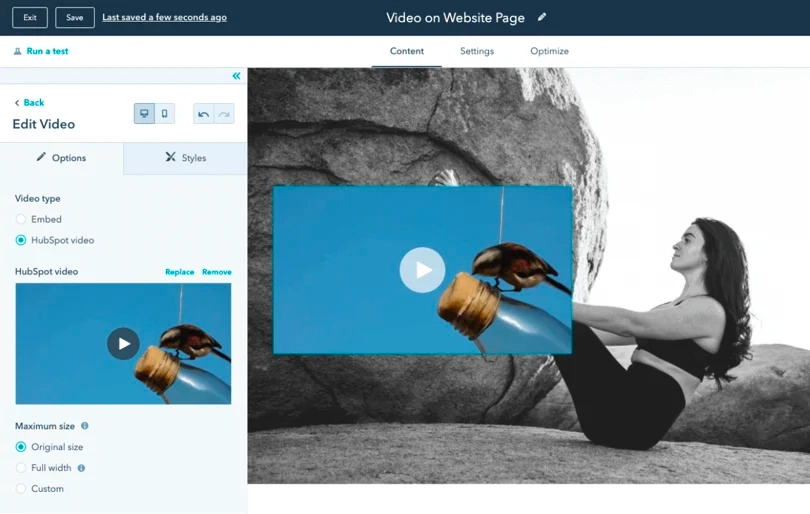
The HubSpot platform targets businesses that use videos for marketing, sales, and lead capture. The service integrates different sectors—including HubSpot CRM, Sales Hub, Marketing Hub, and Service Hub—into a unified interface that makes it easy to disseminate videos wherever they need to go, including your website, social media, and one-to-one video posts.
Don’t think of HubSpot as a YouTube alternative. For one thing, it isn’t free, and for another, it’s all about social sharing to fulfill business needs.
Pros of HubSpot:
- Rated 4.4 out of 5 stars on G2
- Customizable video player
- Insert CTAs at beginning or end of videos
- Sync video views with leads using its AI-powered CRM
Cons of HubSpot:
- No free option to host videos with HubSpot
- Interface is not very user-friendly for beginners
4. Brightcove
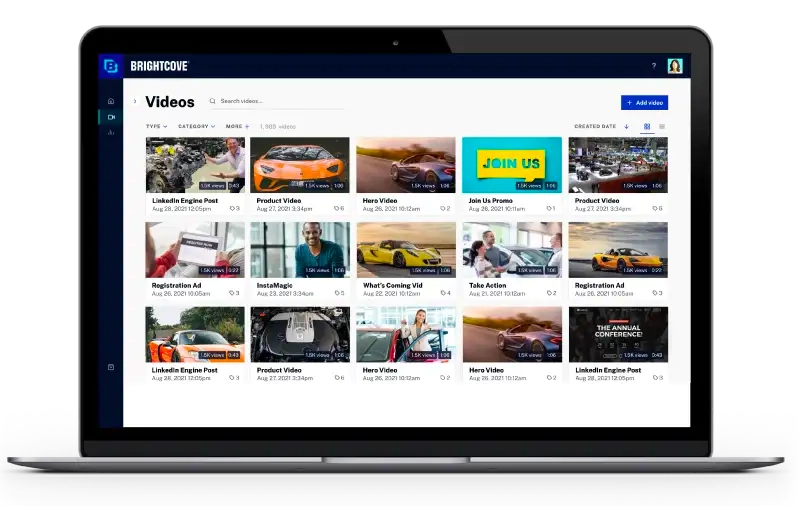
Many corporations use Brightcove, including some major brands like Adobe, MasterClass, and Ford, to power a streaming service, host video ads on their site, or disseminate internal video content (like training videos or conferences).
Brightcove does not offer a free subscription, as its top-of-the-line video hosting is geared toward businesses and enterprise customers. The launch of their Video Cloud Studio, however, makes their services more affordable for individual creators and smaller teams.
Pros of Brightcove:
- Rated 4.0 out of 5 stars on G2
- OTT video hosting solution for big corporations and brands
- Includes embed code for WordPress websites or HTML pages
- More security and privacy options than most other video hosting platforms
Cons of Brightcove:
- Not very user-friendly for beginners
- Pricing is on the high side compared to other video hosting providers
5. Wistia
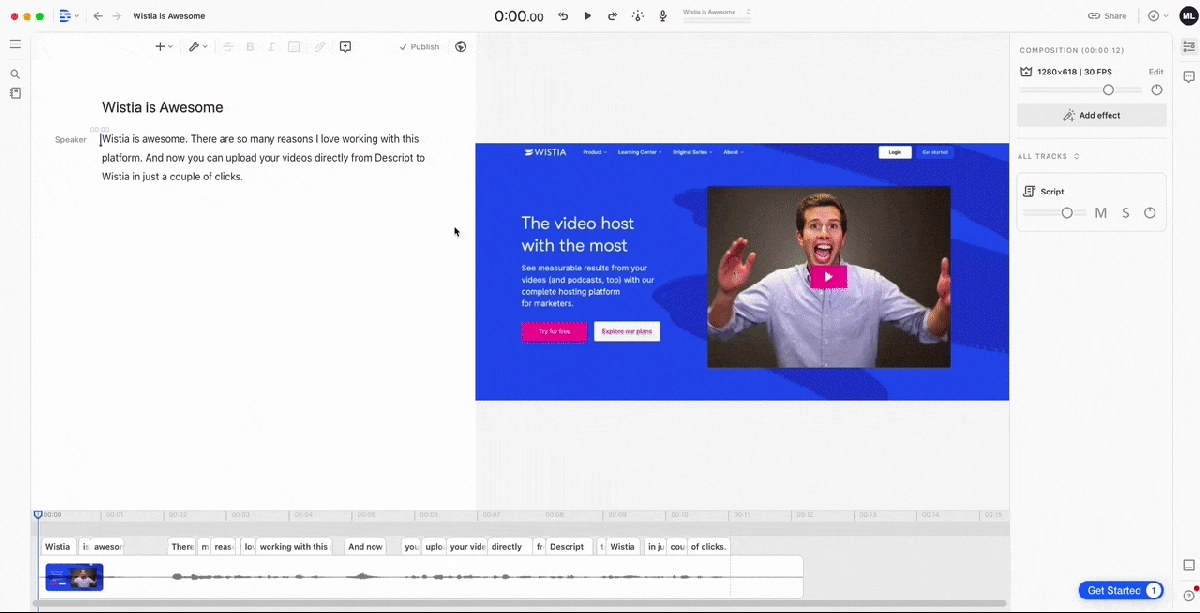
The Wistia platform is excellent for marketing and lead capture. It provides its clients with ample visitor tracking metrics and heatmaps. It never populates your videos with ads, which makes them look clean and focused.
Wistia’s interface is sleek and simple, but many advanced functions lie under the hood. Wistia is a “freemium” service. Its free tier features basic functions, but paid plans significantly enhance what Wistia can do.
Pros of Wistia:
- Rated 4.6 out of 5 stars on G2
- Host ad-free videos
- Simple user interface
- Lots of analytics features
- Free version available
Cons of Wistia:
- Limits on video customization
- Free service is only basic and any advanced features must be paid for
♻️ Sync with Descript: Wistia integration for easier, better video marketing
6. SproutVideo
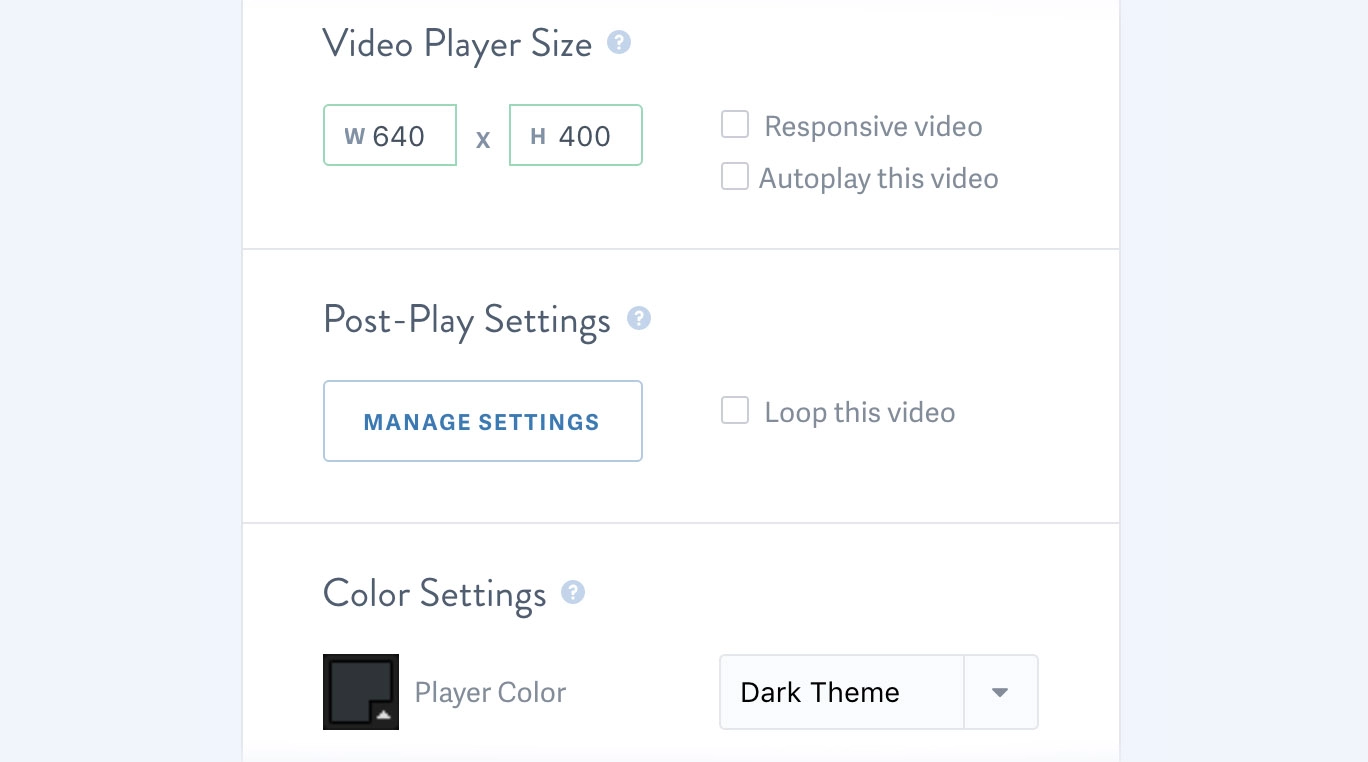
In some ways, you can think of SproutVideo as a middle-ground between YouTube and Wistia. Like YouTube, SproutVideo makes it easy to create video playlists that work well for online series and tutorials. Like Wistia, SproutVideo has ample tools for targeted marketing and lead capture. It also spares your users from ads and irrelevant videos selected by an algorithm—heading off common complaints about YouTube.
Pros of SproutVideo:
- Rated 4.6 out of 5 stars on G2
- Best of both YouTube and Wistia
- Great customer support
- Host ad-free videos
Cons of SproutVideo:
- Glitchy scheduler
- Limited customizable options for video player
- Cheaper alternatives are available
7. Cincopa

If your goal is monetizing your video content, audio content, or still images (rather than use them as marketing tools), Cincopa may be the platform for you.
Much like YouTube, Cincopa seeks to hold a user’s attention and feed them multiple content offerings during a visit to the site. All subscription tiers require monthly fees, but Cincopa tends to be more affordable than many competitors. Consider Cincopa if your online offerings include audio (like music and podcasts) in addition to video.
Pros of Cincopa:
- Rated 4.7 out of 5 stars on G2
- Offers audio and video hosting
- Great for content creators looking to monetize videos
- Offers lots of gallery templates
- User-friendly
Cons of Cincopa:
- All subscription tiers are paid plans
- Video analytics are not very in-depth
8. Hippo Video
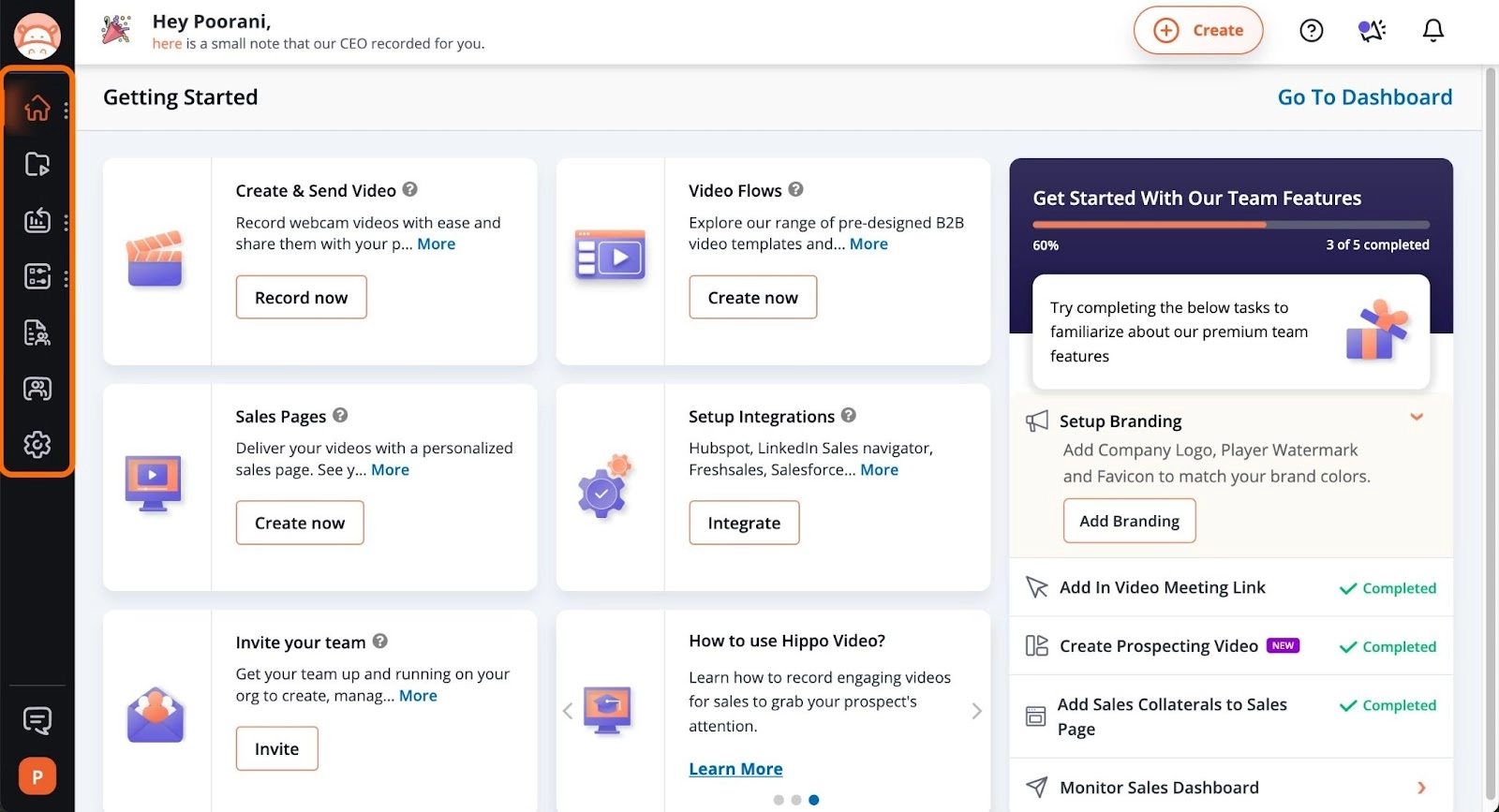
The idea behind Hippo Video is to let a user separate their video offerings into one of the following categories: sales, services, marketing, and internal communications. Each branch offers specialized mechanisms such as in-video forms for marketing, a built-in teleprompter for recording pitches for sales, or video tickets for services.
Hippo Video’s paid plans can be tailored to focus on one or more of these specific needs. It also allows your clients to submit video tickets as a way of communicating with your company, which can be appreciated by those who are more comfortable communicating by voice and video instead of written text.
And while Hippo Video’s lower-priced plans do not offer much video storage, its higher-priced tiers are more on the level of HubSpot, to which it is sometimes compared.
Pros of Hippo Video:
- Rated 4.5 out of 5 stars on G2
- Lots of advanced features
- Can tailor subscription plans to your needs
- Can accept video tickets from clients—don’t have to write an email, can get a video
Cons of Hippo Video:
- Not intuitive for beginners
- Lower priced tiers don’t have a lot of storage
- Lack of tutorials
9. Dailymotion

Of all the video hosting platforms on this list, Dailymotion distinguishes itself as the clearest one-for-one competitor with YouTube. It gets less traffic (on the order of billions), but it arguably does a better job than YouTube of creating clear categories (like music, news, sports, and entertainment) that give video viewers the content they want. It’s also free.
Pros of Dailymotion:
- Large user base
- Clear categories make it easier to find videos
- Free video hosting
- Customizable video player
Cons of Dailymotion:
- Gets less traffic than YouTube
- History of glitches and broken links
10. Vidyard
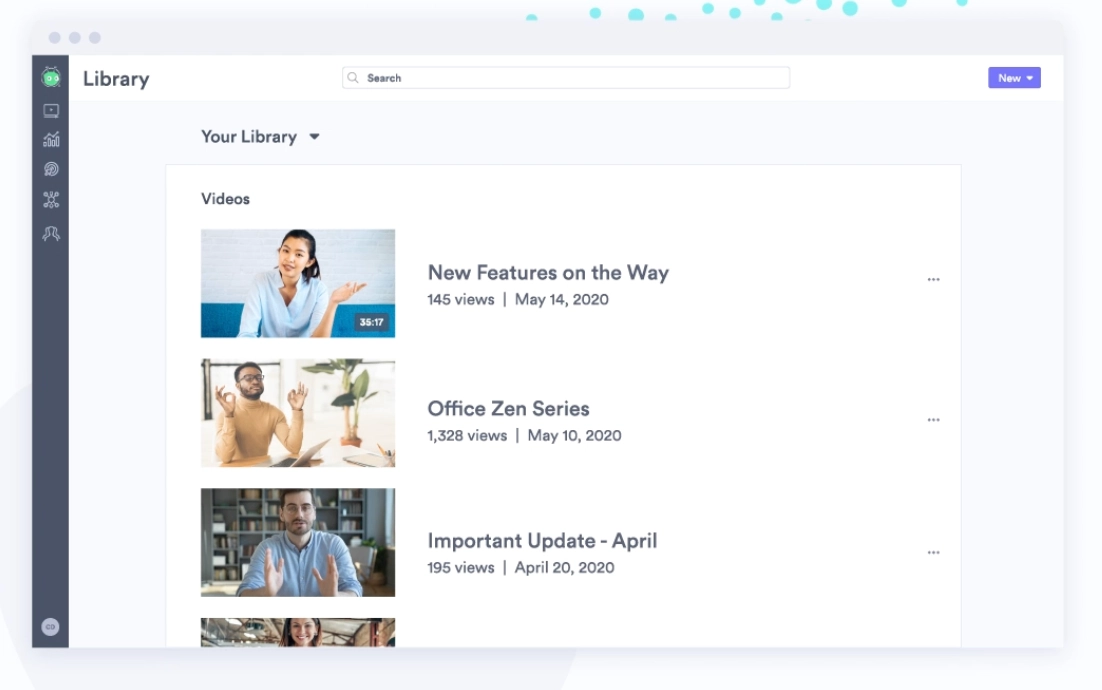
If you have a team of collaborators and need unlimited video hosting with no limits on bandwidth, Vidyard may be your solution. You can use Vidyard for both external audiences (marketing, sales, entertainment) and internal audiences (training, presentations, group editing). This makes it a bit like Vimeo, but with more of a corporate bent. The plans offer unlimited storage, massive bandwidth, a clean interface, and a professional sheen.
Pros of Vidyard:
- Rated 4.5 out of 5 stars on G2
- Has video customization options
- Can use for both public and internal use
- Unlimited storage and lots of bandwidth
Cons of Vidyard:
- Doesn’t integrate with third party apps or plugins very well
- No tutorials on how to use Vidyard effectively
A video editing tool to stand out on any video hosting site
One of the most precious commodities in the search for going viral is time. You need to constantly and consistently create content before people will notice you and your brand. That’s why it’s a good idea to find an all-in-one tool, like Descript, that can saves you time by recording, editing, and even publishing to multiple video hosting sites for you.
Descript has everything a budding filmmaker and marketer needs to create professional and eye-catching content, including:
- AI features that can adjust your gaze so it always looks like you’re looking at the camera
- Easy transcript-based editing
- AI overdub to fix audio mistakes
The best part: Descript has templates for different video hosting sites that will automatically change your video format so you can post to multiple hosting platforms with a single click. All of this saves you time and money, so you can focus on being creative.
Sign up for a free plan today and experience the power of Descript firsthand.
FAQs about video hosting sites
What is the best website to host videos?
- YouTube
- Dailymotion
- Wistia
- Vidyard
- Vimeo
- Brightcove
Which hosting is best for video streaming?
- YouTube – With a massive built-in user base, YouTube easily handles high-volume streams without buffering. It’s also free, supports long videos (up to 2 hours for verified users), and offers worldwide reach.
- Vimeo – Known for high-quality streaming and a more curated feel, Vimeo’s customizable player keeps your videos ad-free. It’s often favored by creators looking for a slick, brand-friendly environment.
- Wistia – Optimized for business and marketing, Wistia gives you detailed analytics on viewer engagement. It’s a strong choice for polished livestreams that need to integrate with sales funnels or CRM tools.
Overall, you’ll want a hosting solution that can handle your audience size while offering the streaming speed, shareability, and brand control you need. YouTube is often easiest for cost-free, large-scale reach, while Vimeo and Wistia deliver more refined, ad-free streaming experiences.
- YouTube
- Vimeo
- Wistia
How can I host a video online for free?
If you can find a video hosting platform with a free tier or free trial, such as YouTube, Vimeo, or Dailymotion, you can host your videos free. Your videos will have basic features and you may have a watermark or other indicator on them.
Is Vimeo still free?
Yes. Vimeo offers a free plan with limited storage and basic features. You can upload up to 500MB per week on the free plan, for a lifetime total of 5GB. This plan doesn’t support advanced customization or analytics. If you need more storage, custom branding, or in-depth analytics, you can upgrade to one of Vimeo’s paid subscriptions.
Where can I host private or family videos?
Several sites support private or password-protected uploads. Vimeo, Wistia, and YouTube let you create unlisted or private links so only people with the link or password can view your videos. Other platforms, like Google Drive, also allow controlled sharing if you prefer to keep videos off public channels.






































